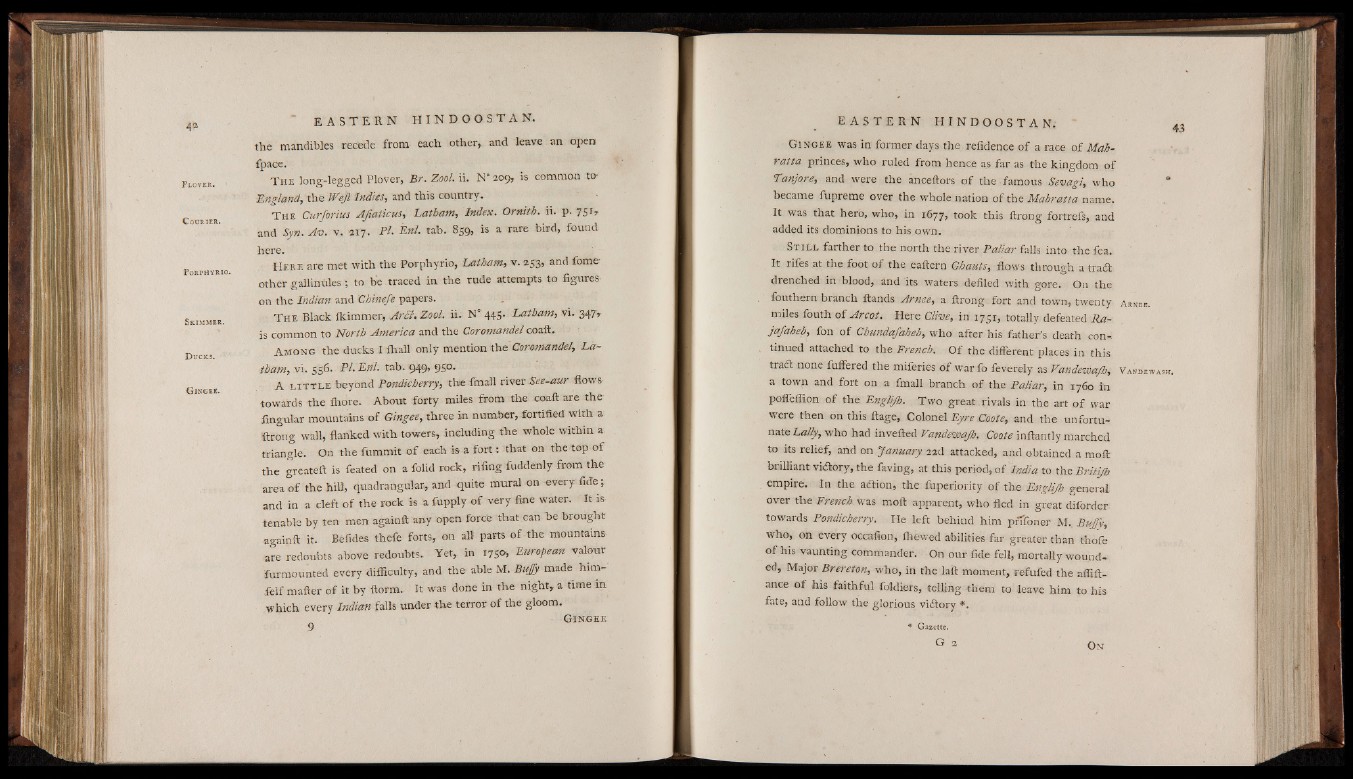
P l o v e r .
P o r p h y r io .
S k im m e r .
D u c k s .
G in g e e .
E A S T E R N H I N D O O S T A N .
the mandibles recede from each other, and leave an opens
fpace.
T he long-legged Plover, Br. Zool. ii. N 209, is common to*
England, the Weft Indies, and this country.
T h e Curforius AJiaticus, Latbarn, Index. Ornith. ii. p. 75H
and Syn. Av. v . 217. PL Enl. tab. 859, is a rare bird, found
here.
H e re are met with the Porphyrio, Latham, v. and iome
o th e r gallinules; to be traced in the rude attempts to figures
on the Indian and Chinefe papers.
T h e Black ikimmer, Arct. Zool. ii. N” 445- Latbam, vi. 347V
is common to North America and the Coromandel coaft.
Among the ducks I ihall only mention the Coromandel, Latham,
vi. 556. PL Enl. tab. 949, 950.
A l i t t l e beyond Pondicherry, the fmail river See-aur flows
towards the fliore. About forty miles from the coaft are the
Angular mountains of Gingee, three in number, fortified with a
ftrong wall, flanked with towers, including the whole within a
triangle. On the fummit of each is a fo r t: that on the top of
the greateft is feated on a folid rock, rifing fuddenly from the
area of the hill, quadrangular, and quite mural on every fide;
and in a cleft of the rock is a fupply of very fine water. It is
tenable by ten men againft any open force that can he brought
againft it. Befides thefe forts, on all parts of the mountains-
are redoubts above redoubts. Yet, in 1750-, European valour
furmounted every difficulty, and the able M. Bujfy made him-
felf matter of it by ftorm. It was done in the night, a time in
which every Indian falls under the terror o f the gloom.
Gingee 9
G ingee was in former days the refidence of a race of Mah-
Yatta princes, who ruled from hence as far as the kingdom of
Pan]ore, and were the anceftors o f the famous Sevagi, who
became fupreme over the whole nation of the Mahratta name.
It was that hero, who, in 1677, took this ftrong fortrefs, and
added its dominions to his own.
St i l l farther to the north the river Paliar falls into the fea.
It rifes at the foot of the eaftern Ghauts, flows through a traft
drenched in blood, and its waters defiled with gore. On the
fouthern branch ftands Arnee, a ftrong fort and town, twenty
miles fouth o f Arcot. Here Clive, in i 75r, totally defeated Ra-
jafaheb, ion of Chundafaheb, who after his father's death continued
attached to the French. Of the different places in this
traft none fuffered the miferies o f warfo feverely as Vandewa/h,
a town and fort on a fmall branch of the Paliar, in 1760 in
pofleflion o f the Englijh. Two great rivals in the art o f war
were then on this ftage, Colonel Eyre Coote, and the unfortunate
Lally, who had invefted Vandewajh, Coote inftantly marched
to its relief, and on January 2ad attacked, and obtained a moft
brilliant vidtory, the faving, at this period, of India to the Britifh
empire. In the adtion, the fuperiority of the Englijh general,
over the French was moft apparent, who fled in great diforder
towards Pondicherry. He left behind him prffoner M. Puffy,
who, on every occafion, fhewed abilities far greater than thofe
o f his vaunting commander. On our fide fell, mortally wounded,
Major Brereton, who, in the laft moment, refufed the affift-
ance o f his faithful foldiers, telling them to leave him to his
fate, and follow the glorious victory *.
* Gazette.
G 2 On
A r n e e .
V a n d e w a s h «